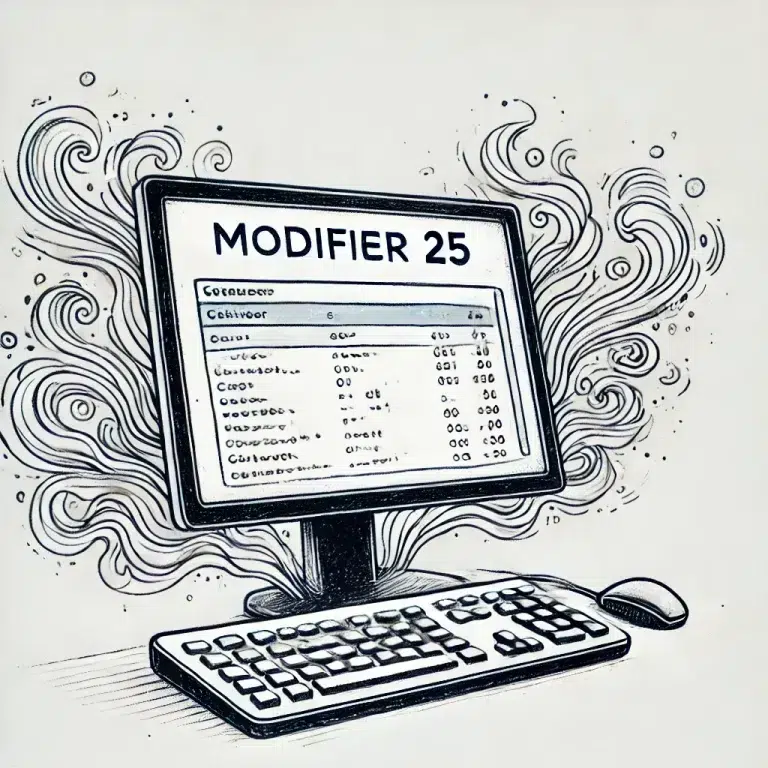Many ENT and audiology practices across the nation struggle with billing and coding. Coding for a range of services requires an in-depth understanding of hearing health care procedures, knowledge of up-to-date coding guidelines and insurance regulations, the ability to recognize which bundled services are included in certain codes and the time to provide accurate documentation necessary for a successful claim submission. Because hiring a billing and coding specialist isn’t always financially viable, most practices do the best they can to follow state rules and regulations. However, there are times when advice is needed. Michelle Netoskie, a seasoned professional and Fuel Medical’s Billing, Coding & Compliance Manager, is here to help members navigate the muddy waters of billing and coding. A common question Michelle gets is: When should I use the AB Modifier when billing patients?
A Recent Addition
The Centers for Medicare & Medicaid Services (CMS) announced the addition of the AB Modifier in January 2023 as a way for audiologists to provide audiology services without an order from a physician, physician assistant or nurse practitioner. It’s used with existing codes when the following conditions are met:
Audiology service furnished personally by an audiologist without a physician/NPP order for non-acute hearing assessment unrelated to disequilibrium, or hearing aids, or examinations for the purpose of prescribing, fitting, or changing hearing aids; service may be performed once every 12 months, per beneficiary.
American Academy of Professional Coders
Some key points to take away from the text above are the following:
- Non-acute hearing assessment: Non-acute hearing loss is a gradual condition, developing over time due to factors such as infection, an accident or other non-acute causes. In contrast, acute hearing loss is sudden and may be a symptom of an underlying medical condition. It’s important to note that acute hearing assessments are treated differently by CMS.
- Unrelated to disequilibrium, hearing aids or examinations for the purpose of prescribing, fitting or changing hearing aids: Medicare doesn’t cover costs associated with hearing aids, so be deliberate about using the AB Modifier for services that don’t result in hearing aids.
- Every 12 months, per beneficiary: Medicare will only pay claims billed using the AB Modifier code once in 12 months. Unfortunately, Medicare doesn’t have a mechanism in place to verify this type of billing, so we recommend having the patient sign an ABN (advanced beneficiary notice—specific to Medicare) form that says this service will be covered unless it was performed in the last 12 months, at which point it’s the patient’s responsibility. If there was no ABN on file, Medicare wouldn’t pay the claim, and the practice would have to write it off.
The Provider Makes a Difference
Another condition of using the AB Modifier is the provider’s qualifications. For a claim to be successful, the provider must be a licensed audiologist. Even though Fuel Medical recommends employing audiology technicians and hearing instrument specialists, their scope of practice is limited. Medicare will only pay claims using the AB Modifier if the hearing assessment is performed by a qualified audiologist.
Diagnostic vs. Treatment-Focused Services
Identifying when audiology services can be billed using the AB Modifier but aren’t related to hearing aids can be confusing. It’s the difference between a hearing assessment being used for diagnostic purposes or treatment-focused purposes. The AB Modifier should be used only for diagnostic purposes, such as the following:
- Routine hearing assessment for an adult: A 60-year-old patient has noticed that it’s becoming increasingly difficult to hear during conversations. There’s no indication that they’ve had an infection, trauma or sudden hearing loss. They’ve never used hearing aids and haven’t even thought about getting them. In this case, an audiologist can perform a hearing assessment to diagnose hearing loss. Because this falls under the category of non-acute, the audiologist can perform the necessary tests without a physician’s order and bill Medicare using the AB Modifier.
- Routine hearing assessment for a child: A four-year-old child is brought into an audiology office for a hearing assessment because the parents notice that the child has trouble following conversations. There’s no indication of a recent illness or infection. The audiologist can perform the necessary hearing assessments to diagnose hearing loss without a physician’s order and bill Medicare using the AB Modifier because there are no signs of acute hearing loss.
- Monitoring existing hearing loss: A 75-year-old patient sees an audiologist to reevaluate their hearing loss after an initial diagnosis of mild hearing loss the year before. The audiologist performs the necessary hearing assessments to determine if the patient’s hearing loss has changed. The patient is being seen for non-acute hearing loss, and there haven’t been any discussions about hearing aids, so the AB Modifier can be used.
Good-Faith Effort
In each of the scenarios above, a good-faith effort was made to diagnose patients’ hearing loss without an underlying purpose of prescribing, fitting or changing hearing aids. Does that mean you can never discuss hearing aids with your patients? No! It means that you perform diagnostic tests to identify hearing loss in one visit; if it becomes clear later that hearing aids should be included in a treatment plan, set up a different appointment to discuss the plan and associated devices. The second appointment cannot be billed using the AB Modifier.
Scenarios to Avoid the AB Modifier
Here are some scenarios when you cannot use the AB Modifier:
- Request for hearing aids: If a 72-year-old patient calls a practice asking for hearing aids, you cannot apply the AB Modifier. This falls outside of Medicare’s designation of medical necessity, so the patient will have to pay out-of-pocket (or use a different insurance, if applicable).
- Updated hearing aid: When an audiologist performs a hearing assessment because a 52-year-old patient wants to get hearing aids that can stream music better than their current hearing aids, the AB Modifier cannot be used. The visit is for treatment purposes instead of being purely diagnostic.
- Acute hearing loss: A disabled 16-year-old patient fell out of their wheelchair and hit their head; they’ve had issues hearing ever since. The audiologist should refer the patient to a physician for diagnosis. After seeing the physician, the patient may return to the audiologist for a hearing assessment. The AB Modifier cannot be used because there’s acute hearing loss.
What Happens if You Get a Denial?
There are many reasons why a claim might be denied. Because it’s difficult to know whether the patient was billed using the AB Modifier within the last 12 months, practices have had claims denied unexpectedly. We recommend having patients sign an ABN form prior to service.
Many practices receive claim denials after noticing a pattern of misuse. We heard of one practice that was billing Medicare for audiograms using the AB modifier, but the driving force behind the exam was to see if the patient’s hearing aid needed to be updated. Since the AB Modifier cannot be used for the purpose of prescribing, fitting or changing hearing aids, the practice was billing Medicare incorrectly.
What happens if a practice doesn’t understand how to use the AB modifier and gets claim denials? If CMS notices a problem, it may conduct a post-payment audit. They’ll look at the documentation accompanying the claim to ensure it meets their criteria. If the practice makes an error, CMS will ask for a return payment if it has already paid the claim. If this persists, CMS might order a forensic audit, which means they’ll look for larger patterns of misuse. The practice may have to pay back a significant amount of money if it’s determined there were multiple coding errors.
It’s All in the Documentation
When CMS performs an audit, either post-payment or forensic, most practices get into trouble with their documentation. If the doctor adds generic notes to patients’ records and they’re all lined up during an audit, this becomes the doctor’s standard of care. This would cause an audit to fail because patient documentation should have unique verbiage; no two patients are the same, so their notes should not be the same.
For example, a doctor may repeatedly say that patients “tolerated the procedure well.” Given that doctors see 20–30 patients a day, there’s likely someone who didn’t tolerate the procedure well. Another example is when the doctor writes, “Procedure also done on the contralateral side.” Not all ears are the same; one ear canal may be more curved than the other.
Careful documentation is one way to illustrate that the doctor did indeed see the patient. If a patient complains to CMS that they only saw the doctor for five minutes and there are multiple procedures listed in the bill, generic documentation can cast a light of distrust on the case.
Next Steps
Issues with billing and coding are common, but they don’t have to be. Michelle Netoskie, Fuel Medical’s Billing, Coding & Compliance Manager, can help you through any problems that you’ve encountered. Reach out to your regional manager today to schedule a billing and coding consultation.
References
- American Academy of Professional Coders. (Feb. 3, 2023). “Don’t assume the codes you’ve been using to report drugs and biologicals still apply.” https://www.aapc.com/blog/87268-check-out-all-the-new-codes-for-reporting-services-and-supplies-to-medicare/


